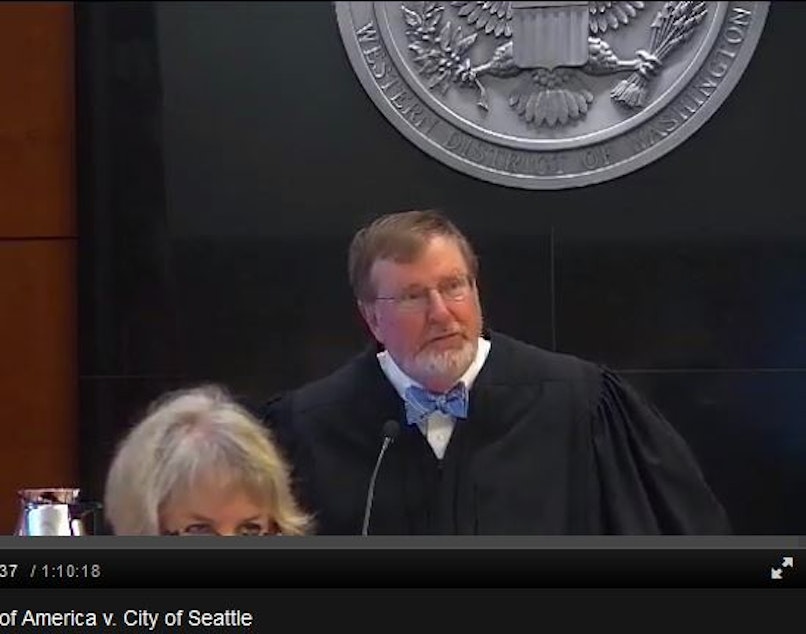Federal judge salutes 'the end of the beginning' of Seattle’s police reform efforts

In a hearing Wednesday, U.S. District Judge James Robart said the Seattle Police Department has made substantial progress in major issues at the heart of a decade-long federal consent decree. He predicted the decree will pass away "in the near future."
Robart said he will file his written order Thursday finding the department in compliance with the decree except for the outstanding issues that the U.S. Justice Department and the City of Seattle had already agreed should remain under court oversight for now: crowd control policies and the disciplinary system for officers found to have committed misconduct.
Police command staff including Chief Adrian Diaz attended the hearing. While officials said they will await the written order to formally comment, Diaz did say he was gratified by the judge’s acknowledgement of the hard work of rank and file officers, saying this moment is “a good place to be.”
Diaz said he agreed with Robart’s paraphrase of Winton Churchill that while this is not “the beginning of the end” for the goal of attaining constitutional policing, it is at least “the end of the beginning” of those reforms.
In announcing this milestone Robart cited improvements to the police department's use of force numbers, crisis intervention, stops and seizures, and supervision.
He said he was most proud of the department's robust system to investigate complaints of misconduct: the Office of Police Accountability, the Office of Inspector General to make system-wide recommendations, and the Community Police Commission, which he said has made progress in defining its mission.
Rev. Patricia L. Hunter, co-chair of the Community Police Commission, said the CPC is in agreement with the steps Robart is proposing, to wind down the consent decree and return to local control. She said the commission shares concerns Robart mentioned over the culture at SPD, including revelations of a pro-Trump campaign sign that hung in the East Precinct.
Sponsored
Robart also expressed concerns over staffing shortages at SPD and potential impacts on officer wellness. Hunter said those issues also resonated for her.
“When one is under stress, some poor decisions can be made, and those poor decisions can impact Black and Brown communities disproportionately,” she said.
While the joint motion filed last March by the U.S. Justice Department and the City of Seattle sought to close out and replace the consent decree with a new agreement addressing the last remaining concerns, Robart said he is denying that aspect of the motion. It’s not clear whether the consent decree will technically remain in place while the remaining issues are addressed.
But Robart suggested that he will not re-open any completed provisions of the consent decree in response to isolated high-profile incidents.
“I take the systemic view as opposed to being focused on individual incidents,” he said. He noted one of the most recent headlines, about a possible leak of body camera footage in the case of a pedestrian killed by an SPD officer. Robart said it’s “infuriating that we battle in the court of public opinion” over these cases.
Sponsored
But a high-profile incident in the past did play a role in Robart’s decision to find SPD “partially out of compliance” with the consent decree in 2019. It was a labor ruling reinstating Officer Adley Shepherd, who had been fired for punching a handcuffed woman in the back of a patrol car. Robart has sought further analyses of whether the appeals process specified in current labor contracts undermines the goal of constitutional policing.
The judge said the tension between police reform efforts and collective bargaining agreements remains an issue “at the national level,” not just locally. He said he cannot and should not be able to alter specific provisions of collective bargaining agreements, but he said he is obligated to act when labor contracts “lock in procedures to avoid accountability.”
Robart also noted that the city of Washington, D.C., has removed officer discipline from the conditions that are subject to bargaining, something police reform advocates in Seattle have also called for. The city and the Seattle Police Officers Guild are currently in negotiations to replace the contract that expired in 2020.


